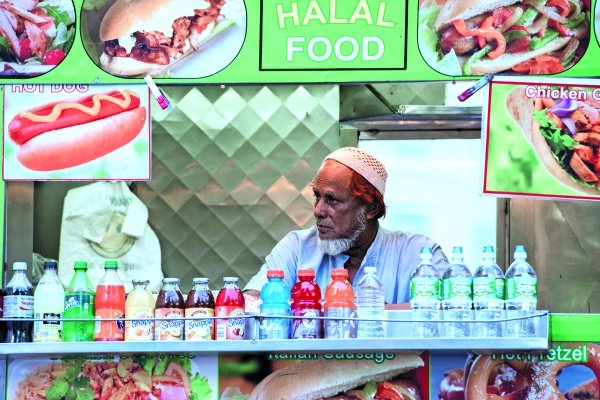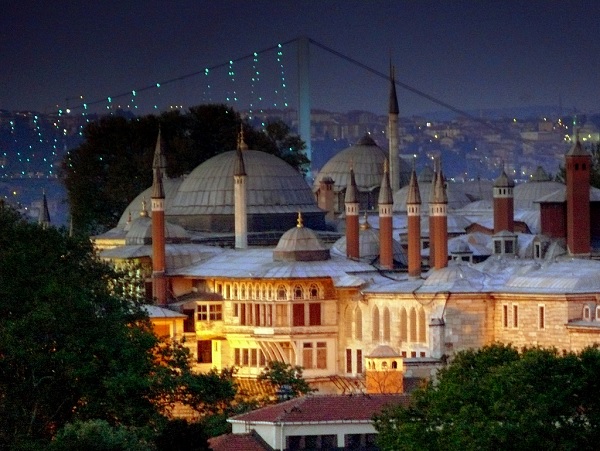
by admin | May 25, 2021 | Halal Industries

Halal food provided during the tour must come from Crescent-rated restaurants with a rating of ‘AA’ or above.
Muscat: Halal tourism is the new buzz word in the travel market around the world and an industry, which is gaining popularity among travellers from Oman, according to experts.
“Yes, it is getting popular and according to analysts the Islamic tourism market is projected to become worth $181 billion by 2018,” Sunil Prabhakar, chief executive officer, Travel Point Oman, said.
Potential
“Acknowledging the potential of the Muslim population, and an increasing demand for ‘Halal’ alternatives in various retail sectors, many countries, including non-Muslim ones, are already jumping on the opportunity and opening up their markets for Muslim tourists,” Prabhakar explained.
Halal tourism is not only about Halal food, as is the larger belief of some people, but is also about the overall experience, which is compliant with the Islamic Sharia culture.
“It is not just being applied to food, but includes anything, which is Sharia compliant. It is a form of tourism for Muslims, who prefer to utilise services, facilities and activities compliant with Islamic principles,” Prabhakar added.
Travel Point has established a “Certificate of Accreditation” with the help of CrescentRating, the world’s leading authority on Halal travel. This certificate is recognised as an Accredited Travel Company in Oman by CrescentRating.
According to Prabhakar, the sector is tailored around the travel needs of Muslim tourists, who seek a family friendly environment and destination. The fundamentals include a Halal hotel, Halal food premises, Islamic finance, Islamic travel packages, Medicare tourism, and a Halal spa.
Out of these, Halal food normally is the biggest criteria, “Halal food provided during the tour must come from Crescent-rated restaurants with a rating of ‘AA’ or above, and the same applies to the list of restaurants provided in the package. Prayer facilities are also expected in all rated packages and include a stop in the itinerary for combined Zuhr and Asr prayers,” he added.
Travel Point has been operating in the Halal travel market since March 2015, and has witnessed an increase in demand for Halal Tourism Services from Oman year after year. “We can confirm that the demand is increasing year after year and we have not witnessed any downturn in this leisure segment due to the economic downturn.”
Some of the most popular destinations for Halal tourists are Spain, Vienna, Munich, Bangkok, London, Delhi, Gold Coast, Sri Lanka, Singapore, Bosnia, Herzegovina, Malaysia, United Arab Emirates, Qatar, Saudi Arabia, Indonesia and Brunei.
Travel Point offers more than 250 Halal holiday packages, such as Madrid and the Gems of Islamic Spain, the Bosnian Nature Tour, Adventurous Indonesia Tour and several others. They also have a database of Halal Hotels.
A sharia-compliant hotel means no alcohol, Halal food, no pork, no discos, and facilities for prayers and healthy family-oriented entertainment. This trend is catching up fast, not only in the Gulf region, but even European markets are exploring the possibility of opening such hotels in a bid to grab a share in the Arab tourist market.
Muslim Mehmood, general manager at Al Hashar Travels said Halal tourism is the need of the hour and has increased in the last few years.
“It is the need of the times since the international holiday concept is increasing in Arabs, and many countries are focusing on this as it is the demand for valued customers, who have a strong spending power.”
(Courtesy:http://timesofoman.com)

by admin | May 25, 2021 | Halal Industries
 Turkey’s beleaguered tourism sector hopes to reap the fruits of a number of diplomatic steps to improve ties with Israel and Russia, as the number of foreign arrivals to the country plummeted to record lows.
Turkey’s beleaguered tourism sector hopes to reap the fruits of a number of diplomatic steps to improve ties with Israel and Russia, as the number of foreign arrivals to the country plummeted to record lows.
“Due to regional and global crises and some bilateral problems with some countries, we have seen tourism figures that are lower than we had earlier expected. We expect a significant rise in local tourist numbers thanks to the nine-day public holiday for Eid al-Fitr. We also expect that one of the positively affected areas of our improving ties with both Russia and Israel will be seen in the tourism sector,” said Prime Minister Binali Yıldırım on June 28, during his speech at a parliamentary group meeting.
The number of foreign arrivals to Turkey slumped by 34.7 percent in May compared to the same month of 2015 to 2.49 million, according to data released by the Tourism Ministry on June 28. This marked the steepest decline since the 1990s.
Arrivals from Russia slump 92 percent
In May, Turkey saw dramatic declines mainly in arrivals from Russia and Western countries amid rising security concerns and the diplomatic row with Russia, which was the second largest foreign tourist source for Turkey until recently.
The number of Russian tourists visiting Turkey declined by around 92 percent to 41,004 in May compared to the same month of 2015, while the number of arrivals from Germany dropped by 31.5 percent and from Britain by 29.4 percent to around 427,000 and 219,000, respectively.
The number of foreign people visiting Turkey decreased by 22.9 percent to 8.3 million in the first five months of this year compared to the same period of 2015, data also showed. Tourism players expect revenue losses of around $15 billion this year.
The head of the Travel Agencies Association of Turkey (TÜRSAB), Başaran Ulusoy, reminded that the number of Israeli tourists visiting Turkey hit its highest in 2008 at over 550,000.
“With the gradual improvement in our ties with Israel, we expect a dramatic rise in the number of Israeli tourists visiting Turkey,” he told Anadolu Agency, adding that the number of arrivals from this country has already increased by 40 percent this year compared to the previous year.
The head of the Hoteliers’ Federation of Turkey (TÜROFED) said the target from this market should be 1 million tourists.
“With the deal, we expect a rapid recovery in the Israeli market. Our target should be to attract at least 1 million Israeli tourists, as Israel is very proximate geographically. They can arrive in Turkey in a very short time, usually choosing Istanbul and Antalya to visit,” said TÜROFED head Osman Ayık, as quoted by Anadolu Agency.
Saying that the improving ties with both Israel and Russia would have a very positive impact on the sector, the head of the Turkish Hoteliers’ Association (TÜROB), Timur Bayındır, added: “This is what should be done. We can see further yields if our ties with Egypt are recovered.”

by admin | May 25, 2021 | Halal Industries

Saif Alam siddiqui
By Saif Alam Siddiqui, Maeeshat News: Over the past two decades, Halal has been transformed from an exclusive niche market for Muslim consumers into a dynamic global market phenomenon that shows every indication of playing a significant role in global trade in future years to come, the past decades have also witnessed a tremendous curiosity concerning Islam. Islam is not just a religion but a way of life, its unimaginable for a Muslims to give up their faith for the sake of relaxation, or even slightly loosen up. Muslims are more conscious of their believe whether its Halal food, Islamic banking or now Halal tourism for a Muslim he/she has to follow the permissible ways of Islam at any cost, in a nutshell Muslim should led a Halal way of life.
Traditionally this trend has been focused mainly in food, in their political and cultural contexts. Now Halal tourism is in trend and is welcomed by world second largest demography. To understand the growth and evolution of the Halal market, it is useful to focus on factors and forces that are evidently driving this market forward. From customer awareness to technological Innovations, the Halal market is continuously being influenced and driven to new levels of evolution.
Observant Muslims typically avoid alcohol and areas where there can be excessive nudity, like beaches and nightclubs. For women who adhere to Islam’s modest dress code, swimming can pose a challenge, that means resorts that offer gender-segregated beaches and pools would be Halal tourist destination.
It is noted that Muslim customers become sensitive to consume products and services which are Shariah compliant moreover, the awareness among Muslim increased to select Halal options for their needs from the options currently offered. Therefore, some non-Muslim destinations such as Japan, Philippines, and Brazil offered Muslim friendly options after analyzing the scenario as it was facing problematic by Muslim travelers. Recently there was good imitative taken by Chambers of Commerce in Japan and Philippine. Travel Agencies Association organized seminars to train the tourism industry to satisfy Muslim tourist needs. Moreover, prayer rooms are allocated at major airports and restaurants offer Halal Food.
Halal tourism is a subcategory of tourism which is tailor for Muslim demography the hotels in such destinations do not serve alcohol and have separate swimming pools and spa facilities for men and women. The Halal tourism industry also provides flights where no alcohol or pork products are served, prayer timings are announced, and religious programs are broadcast as part of entertainment offered on board.
As Islam is the fastest growing religion therefore there is a potential for boom in this sector, there is a future market for a Halal startup airline, which could provide Halal food, prayer calls, Qur’an in seat pockets and provide separate sections for male and female travelers, many international hotels do serve Halal food. Some hotels have also employed people from the Muslim world to provide translation services and other assistance that may be needed by tourists from Muslim countries.
It is not just manufactured Halal products or Islamic banking, Services such as Halal holidays are also booming. Let us analyze some fact figure which will crystal clear the scenario according to MasterCard-Crescent Rating Global Muslim Travel Index (GMTI), Halal tourism was worth USD 145 billion in 2014 and is expected to grow to USD 200 billion by 2020. In Britain alone, Muslim tourists spent 21 billion pounds last year and most were inbound tourists from the Middle East.
Muslim customers are one of the fastest developing market segments and their needs cannot be ignored by destination marketers and tourism operators. According to the Global Islamic Economy report, by Thomson Reuters in collaboration with DinarStandard, the global Muslim travel market was worth USD 140bn in 2014, which represents 11.5% of global expenditure. The same report also predicts that the segment is expected to be worth USD 238bn in 2019 and represent 13% of global expenditure. The tourism industry is increasingly competitive; therefore, innovation is one of the success factors in this huge market. The rapid growth of the Halal tourism industry not only gives birth to ‘Muslim-friendly’ or Halal friendly hotels, but also of specialized travel agencies which offer Halal holiday packages. Another episode is the emergence of specialized booking services; the largest of these is www.HalalBooking.com, which offers a specialized search and booking service for online customers concerned of Halal and looking for Halal trip or Halal vacations Furthermore, a number of consultancy firms have appeared which help companies to adapt to Muslim holidays or Halal holidays.
 It is expected that Halal tourism industry could be competitive in upcoming years. Destinations, hotels and resorts, airlines, and travel agents are recommended to position itself in Halal tourism market. The initiatives which are taken to make the destination Muslim friendly by some non-Muslim countries may motivate other destinations to be Muslim friendly. It is expected that worldwide global brands in hospitality Industry may address this opportunity. Furthermore, many countries and businesses in Asia Pacific region are expected to increase attention to Halal tourism and may start to take initiatives to be Muslim friendly. In Muslim minority countries such as India, Taiwan, Vietnam, China, and South Korea, Halal tourism is considered a good business opportunity.
It is expected that Halal tourism industry could be competitive in upcoming years. Destinations, hotels and resorts, airlines, and travel agents are recommended to position itself in Halal tourism market. The initiatives which are taken to make the destination Muslim friendly by some non-Muslim countries may motivate other destinations to be Muslim friendly. It is expected that worldwide global brands in hospitality Industry may address this opportunity. Furthermore, many countries and businesses in Asia Pacific region are expected to increase attention to Halal tourism and may start to take initiatives to be Muslim friendly. In Muslim minority countries such as India, Taiwan, Vietnam, China, and South Korea, Halal tourism is considered a good business opportunity.
One of effective means of accessing the market is to make Halal food widely available in the destination which is considered the high Priority for Muslim tourists. The so-called “Halal tourism” market was once seen as a niche revenue stream, limited to pilgrimages to Mecca only has become the multi-billion dollar-a-year revenue stream. But now there’s a movement in the tourism industry to widen the “Halal tourism” market to cater to Muslim travelers worldwide, particularly those from wealthy Gulf Arab states.
Malaysia, Turkey and many more countries are trying to attract Muslim tourists from all over the world offering facilities in accordance with the religious beliefs of Muslim tourists. Malaysia is aggressively seeking more Muslim tourists, promoting itself as Muslim-friendly Malaysia
Travelers from Saudi Arabia, Kuwait, Qatar, the United Arab Emirates, Bahrain and Oman spend USD 64 billion traveling this year and are expected to spend USD 216 billion by 2030, according to a research. The study found that, on average, a traveler from these countries spends around USD 9,900 per trip outside the Gulf, for Emiratis, the figure reaches upto USD 10,400.
(Saif Alam Siddiqui can be contacted at saifalam89@gmail.com)

by admin | May 25, 2021 | Halal Industries

Konya city Turkey. Image from wrirosscities
Konya, Turkey (IINA) – The central Turkish city of Konya, which was designated the Islamic capital of tourism by the Organization of Islamic Cooperation (OIC), hosted on Tuesday a two-day event about halal tourism, Daily Sabah news reported.
Dubbed the largest event for the thriving halal tourism industry and bringing together thousands of industry professionals from around the world, the event kicked off at Konya’s Mevlana Cultural Center.
Speaking at the event, Minister of Culture and Tourism Mahir Ünal said halal tourism reminded the world about “a new sensitivity.” “It is about people’s desire for exploring new places and being respected for their (religious) preferences. It is actually more than a tourism phenomenon exclusively catering to members of a certain faith, and its broader message is that tourism with its embracing spirit, should respect tourists’ sensitivities, faiths and preferences,” he said. Ünal said Turkey received 7.6 million tourists from Muslim countries in 2015, and this was about 30 percent higher than 2014.
Ünal said his ministry would continue supporting halal tourism industry events such as the conference.
Dr. Bandar Fahad al-Fehaid, who heads the Arab Tourism Organization of the Arab League, said at the event that his organization would soon open an office in Istanbul to support halal tourism. Al-Fehaid said the rising Muslim population around the world, which will account for 26 percent of the global population in 2030, makes Muslims “significant consumers” of tourism, and called upon the tourism industry to be more mindful of Muslim tourists’ demands for tourism activities.
Turkey is the 3rd most popular destination in the global Muslim travel market, according to the most comprehensive research yet released on this sector. The MasterCard-CrescentRating Global Muslim Travel Index (GMTI) 2016, which covers 130 destinations, saw Turkey take third place on the list of OIC destinations behind Malaysia, which retained its primary position followed by the Emirates.
The conference is expected to foster halal tourism and further contribute to Turkey’s popularity as a trending travel destination.
In 2015, there were an estimated 117 million Muslim visitor arrivals globally, representing close to 10 percent of the entire travel market. This is forecasted to grow to 168 million visitors by 2020 equal to 11 percent of the market segment, with a market value projected to exceed $200 billion, according to studies. Asia and Europe were also identified as the two leading regions in the world for attracting Muslim visitors, accounting for 87 percent of the entire market, according to GMTI.






